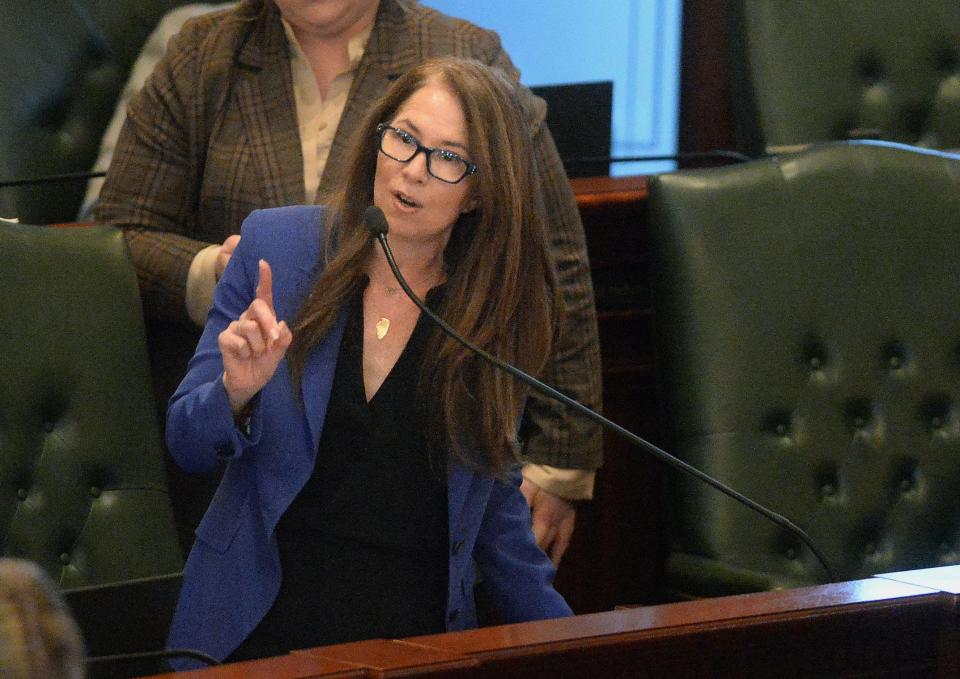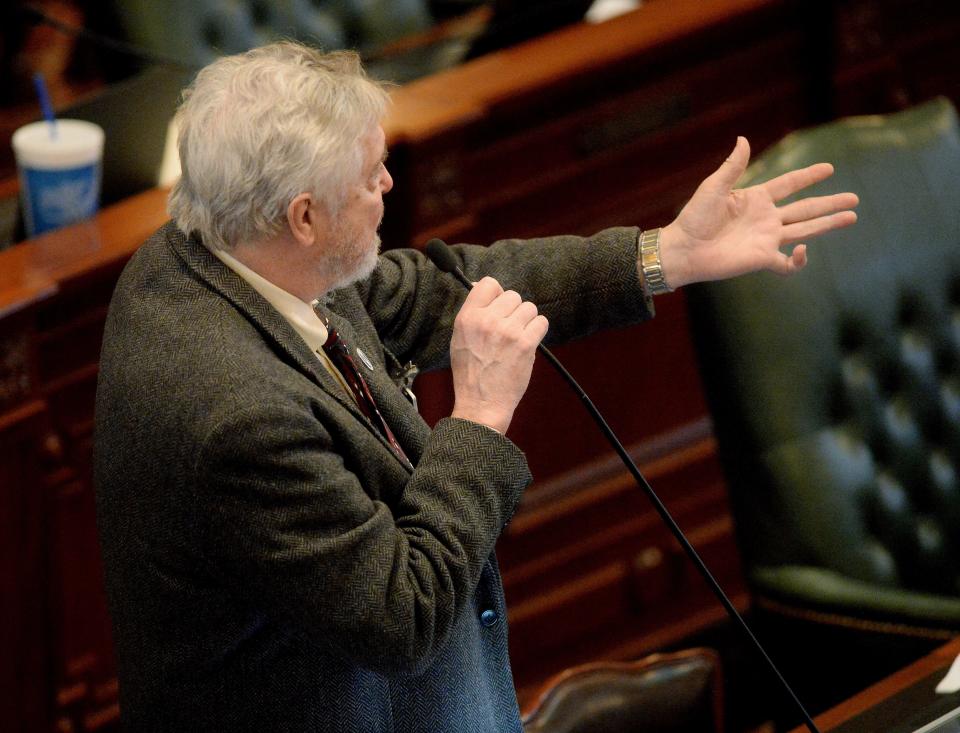Illinois General Assembly: House sends cat declawing ban, rideshare service bills to Senate
- Oops!Something went wrong.Please try again later.
With the deadline to advance legislation to the next chamber fast approaching, the Illinois House of Representatives began passing dozens of bills last week.
The House was the sole chamber in session in the Capitol with several Senate committee meetings held in Chicago. House committee meetings were also convened in Springfield.
A review of the General Assembly website found the House approved 47 bills between Tuesday and Thursday that will go to the Senate. Here's a look at some of the highlights.
House Bill 1533: Bans cat declawing
In Illinois, cat owners can declaw their pets. With House Bill 1533, the state would join New York and Maryland as the only states banning the practice.
Related:These 10 bills have, so far, survived the first half of the spring legislative session
The bill from state Rep. Barbara Hernandez, D-Aurora, passed in the House on Thursday 67-38 with several Democrats opting to not cast a vote either for or against it. The Senate will now consider the legislation.
Hernandez said declawing essentially "amputates" a cat up to their knuckle. Her bill calls for a gradually increasing rate of fines for those declaw - $500 for a first violation, $1,000 for the second and $2,500 for a third. The only exception would be for when declawing is needed for a medical procedure.
House Republicans came down against the legislation in droves with claims that most veterinarians were also opposed. State Rep. Charlie Meier, R-Okawville, noted concerns about what happens when an older person is scratched.
"I actually know a person who was scratched by their cat and for a month and a half had to fight to keep their hand," Meier said. "In some cases, this is very necessary. And there are pain medicines that these cats are given if this has to be done."
The opposition to the bill was a surprise to state Rep. Kelly Cassidy, D-Chicago, who said she often volunteers at animal foster care centers. Hernandez added the reasons often for declawing cats are insufficient when considering the harm it provides to them.
"There's a lot of cats that are declawed for no good reason either because they don't want to maintain their claws because they don't want to have furniture damaged," she said. "And then they send this cat outside defenseless."
House Bill 2231: Common carrier status for ride-shares

Lawmakers are considering a bill that would treat ride-share companies such as Uber and Lyft as “common carriers,” opening them up to the same level of liability as other forms of public transportation.
House Bill 2231 passed on the House floor this week with a 73-36 vote. The bill now awaits consideration in the Senate.
The common carrier status is defined as a “standard of care” under which passengers surrender their safety to certain modes of transportation. Currently in Illinois, this includes taxicabs, railways, and elevators, among others.
“The reason for treating common carriers and holding common carriers to a higher standard of care is the lack of control that the rider has,” said Rep. Jennifer Gong-Gershowitz, a Democrat from Glenview and the bill’s lead sponsor. “There is no difference between the lack of control that a rider has the moment they step into an Uber or a Lyft and the lack of control that a rider has when they step into a taxicab or a train or an elevator.”
The push for the bill is spurred by concerns for rider safety, particularly after an Illinois Supreme Court case that was settled out of court in January 2022. The case’s prior appellate court opinion affirmed ride-share companies’ exemption from the common carrier status after a Lyft driver allegedly raped a passenger in 2017.
The alleged rape occurred in Chicago, when a woman identified as Jane Doe hailed a Lyft after a night out with her friends. The Lyft driver picked her up and, at some point during the ride, the woman fell asleep. The driver then drove to a secluded alley where he brandished a knife, zip-tied her hands and repeatedly sexually assaulted her, according to a court filing in the case that was settled in 2022.
Despite the woman's argument that ride-share companies such as Lyft should be held to the same liability standard as established common carriers, the appellate court upheld the exemption because of the specificity of the statute. The case was settled out of court before the Supreme Court could rule on it.

“Were we to hold that TNCs (transportation network companies) are subject to the same liability standards as common carriers, it would strip the relevant language of (the section of the statute) of all meaning,” Illinois First District Justice Bertina Lampkin wrote in the appellate court decision.
Gong-Gershowitz argued that, if not for the law, Lyft may have been liable in this instance.
“This exemption from the common carrier doctrine insulates TNC’s liability from the acts of their drivers when injuries to their consumers occur,” Gong-Gershowitz said in a committee hearing. “Other common carriers…do not enjoy this exemption and it has been used by ride-share companies to shield themselves from liability and auto crashes and cases where drivers have sexually assaulted their passengers.”
The statute in question, part of the 2014 Transportation Network Providers Act, states TNCs and their drivers “are not common carriers, contract carriers or motor carriers, as defined by applicable State law, nor do they provide taxicab or for-hire vehicle service.”
Opposition to the legislation centered on a concern that the common carrier classification may negatively impact business for ride-share companies.
“One of the reasons these entities have been so successful has been costs aren’t as great as they are with other entities,” Rep. Patrick Windhorst, R-Metropolis, said during the House debate. “So by increasing regulations or burdens on business then we may drive them out or make them less successful.”
In an interview, Gong-Gershowitz refuted that claim, asserting ride-share companies are not a cheaper option anymore.
“When you look at surge pricing, when you look now at what riders pay to take an Uber or Lyft from one place or another, I would argue that the price comparison to other forms of transportation…being a less expensive option no longer is what’s born out in the market,” Gong-Gershowitz said.
According to Crain's Chicago Business, the average fare for Ubers in Chicago increased by 80 percent and by 73 percent for Lyft since 2019. According to the same report, the average fare for taxis increased by 50 percent.
Gong-Gershowitz added the cultural landscape around ride-share companies has shifted since their inception, eliminating the need to treat them differently from alternative modes of transportation.
“I think almost everybody now, at all ages, has an app on their phone and knows how to use both ride-share apps for Uber and Lyft, as well as other things,” Gong-Gershowitz said. “So the dominance of technology in terms of the way we handle transportation, and many other things, has transformed the world that we live in over the last 10 years. And so the rationale that existed in 2015 just doesn’t hold up in today’s market.”
Other bills of note
House Bill 42: Legislation from state Rep. La Shawn Ford, D-Chicago, that would allow the Illinois Department of Public Health to issue autism awareness decals. Passed in the House unanimously.
House Bill 1591: Cassidy's bill amends the Illinois Marriage and Dissolution of Marriage Act by removing "archaic" language pertaining to a clause voiding an out-of-state couple marrying in Illinois that does not intend to stay in the state. Passed 80-23 on Thursday.
House Bill 2067: Sponsored by state Rep. Maurice West, D-Rockford, this bill would permit incarcerated people in the Illinois Department of Corrections and Department of Juvenile Justice to request a facility transfer every six months. Current law allows for a request after three years. Passed in a vote of 70 to 39.
What's next?
The bills will head to the Senate chamber, where they will face committee and could see potential amendments. By the end of the month, both chambers will have advanced nearly all of their bills that will become the legislative focus for the remainder of the spring session.
The House has until Friday to move bills past third reading and onto the Senate. March 31 is the third reading deadline for the Senate.
This deadline, however, can be avoided in a sense by adding amendatory language to a separate, shell bill that passed one chamber. Senate Democrats deployed this tactic most notably during the veto session with House Bill 5471, becoming the Protect Illinois Communities Act - which banned the sale, manufacture and use of assault-style weapons but is now subject to several state and federal lawsuits.
Capitol News Illinois' Nika Schonoover contributed to this report.
Contact Patrick Keck: 312-549-9340, pkeck@gannett.com, twitter.com/@pkeckreporter.
This article originally appeared on State Journal-Register: Illinois House begins advancing bills to Senate as deadline looms

